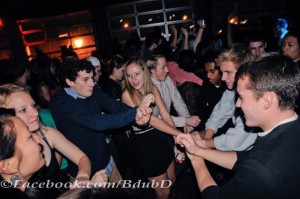
Courtesy of facebook.com
Since the University’s decision to partially reinstate bar buses in February following a complete moratorium on them in November 2011, there has been little movement on the part of students or the administration to fully reinstate the buses, but by some accounts various student groups are not following existing off-campus bar bus policies.
According to SA Senator and junior Henry Macias, who sits on the Off-Campus Bar Party Committee, “there have been cases this semester” where bar buses have picked up students from off-campus locations, which itself is not explicitly in violation of University policy. The issue is that these groups are violating off-campus bar bus policies by not obtaining necessary approval through the committee.
Macias believes that the administration knows these violations are occurring and said that one “can assume who is having [the events].”
“I don’t know exactly what the administration is planning to do about it,” he said.
Associate Dean of Students Anne-Marie Algier, who chairs the committee, said that buses can pick up students off campus if the groups were following other University protocol.
Organizations must obtain approval for any events through the Off-Campus Bar Party Committee and follow certain procedures, such as verifying attendees’ ages and submitting an evaluation form after the event.
Algier, however, said she does not know of any violations this semester or of any groups asking buses to pick up students off campus.
“To my knowledge, groups are not doing it,” she said.
Dean of Students Matthew Burns also said that he was unaware of any violations.
Earlier this semester, Monroe Transportation asked UR to sign a contract giving them permission to pick up UR students from off campus locations and effectively waiving the company’s liability.
Burns called this request “ridiculous” and said the University said no because “that’s why we have the bar bus policy that we do.”
“I think [the contract] implied that people are making this request of Monroe Transportation, not that it’s going on,” Burns said, adding that he also thinks the contract request showed that Monroe is “concerned about the same issues we are.”
“It’s almost inconceivable for any third party to not run into the same issues,” he said, noting the prevalence of issues which led to the original moratorium such as pre-gaming, students rushing unsafely into bars and onto buses, physical altercations and vandalism.
Senior Ellie Sacks, who is the Panhellenic Representative on the Off Campus Bar Bus Committee, said she thought the contract from Monroe Transportation showed that organizations have been seeking alternate means of participating in bar party events.
“I don’t think it necessarily implies that violationa are going on, but organizations are definitely trying to look for other ways to have social events,” she said.
Sacks said she thinks the policies are somewhat unclear to many groups and that it is a “very hairy situation.”
Macias said that he thinks students are not ready to have open bar buses reinstated because of previous issues and because he believes the community has not yet taken the necessary steps toward improving awareness and education.
“I don’t think we’re ready, but I definitely want to see them come back,” he said. “I think we definitely need to educate the public about drinking and how to take care of yourself.”
Macias added that it is “a shame” that the current policy might be restricting student access to bar parties.
“I think bar parties are an excellent way to relieve stress … and are a very good doorway to college night life. I feel they are a healthy thing,” he said.
Macias believes it is ultimately up to students to make the change toward unrestricted bar buses.
“I think it’s completely fine that the administration is not doing anything,” Macias said. “Students have to stand up for it.”
Macias added that the administration is open to support, questions and meeting with students, but students have to write the proposal to Burns.
Algier said that the proposal would need to put forth a different strategy that shows students can work through issues that have previously plagued bar events. She agreed with Macias that she has seen little student initiative pushing for them to come back.
“I’m not hearing uproars,” Algier said.
Algier believes that this could be in part because students are going to off campus venues in other ways.
“Students know how to get out into the community if they choose to,” she said.
Burns agreed with Algier and Macias that there has not been “a big uproar” among students pushing for a full reinstatement of bar buses in part because he thinks that students under 21 both do not have a strong case to make and have little incentive to do so.
“It’s probably possible to make a proposal, but there is not enough incentive to make it happen,” he said.
Burns also said that it is hard to quantify the “success” of the partially reinstated bar buses. Incidents have been kept to a minimum, but rumors of students trying to circumvent the policy cast doubt on the success, as does the fact that student groups have resorted to less efficient means of traveling to venues, such as taxis.
He added that if students were to submit a solid proposal that was feasible and cost-effective then the administration would absolutely consider reinstating all bar buses, but noted that a completely safe system can be expensive.
SA President and senior Roshal Patel said that he has seen evidence of student interest in fully reinstating the buses and that along with the SA he has “every intention of pushing forward” a proposal, as he views bar parties as an important part of student life.
“The biggest reason students don’t go is because they don’t have transportation,” he said.
Patel said he has hesitated to push forward with a proposal this semester because of conduct issues on the Orange Line, but intends to more actively pursue writing a proposal beginning next semester, as many of these issues have abated.
Algier said that the issues with the Orange Line were particularly worrisome on Thursday nights this semester and primarily result from overcrowding on buses. These reports have lessened and she has not had any lately, she said. Algier agreed with Patel that these kinds of incidents are evidence that perhaps bar buses should not be reinstated.
“When I see that behavior, I think it means that students are not ready for bar buses to be brought back,” she said.
Patel feels it is important to “pro-actively send out a message of respect” because the same problems are encountered every four years when a new group of students comes to the University.
“We need to show that we can be responsible for each other to get the buses back,” he said.
Buletti is a member of the class of 2013.




